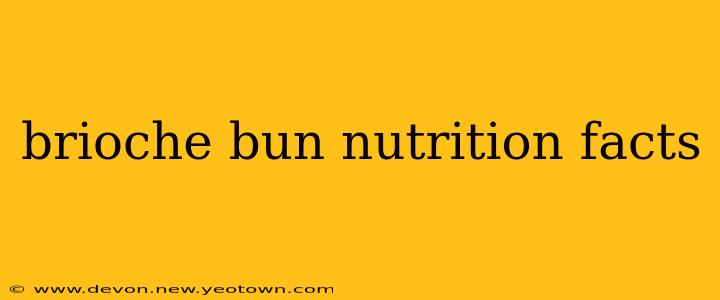Ah, the brioche bun. That soft, buttery, slightly sweet pillow of dough that elevates a burger, sandwich, or even a simple sausage to gourmet heights. But before you sink your teeth into another delectable bite, let's take a closer look at the nutritional facts behind this culinary delight. It's not just about taste; understanding the nutritional content helps you make informed choices about your diet.
This isn't just a simple recitation of numbers; we'll explore the nutritional composition of brioche buns, compare them to other bread options, and address common questions people have. Think of it as a nutritional adventure!
What are the Macronutrients in a Brioche Bun?
A typical brioche bun (around 100g) is generally higher in calories, fat, and carbohydrates than a standard hamburger bun. This is primarily due to the enriched nature of the dough – think generous amounts of butter, eggs, and sometimes even sugar. Let's break down the macronutrients:
- Calories: Expect to find roughly 300-400 calories per bun, depending on the size and specific recipe. This calorie count is significantly higher than many other bread choices.
- Fat: The richness comes from the significant fat content, largely from the butter used in the dough. You can expect a grammage in the range of 15-20g of fat per bun.
- Carbohydrates: Brioche buns still provide carbohydrates, the body's primary energy source, typically between 40-50g per bun. However, the presence of added sugar in many recipes increases the total carbohydrate count.
- Protein: While not a primary source of protein, brioche buns contribute a modest amount, around 5-8g per bun.
How does Brioche Bun Nutrition Compare to Other Breads?
Compared to other bread types like whole wheat or sourdough, brioche buns are considerably higher in fat and calories. Whole wheat bread, for example, generally boasts a higher fiber content and lower fat, making it a more nutritionally balanced choice. However, brioche's unique flavor and texture come at a cost. The comparison isn't about superiority, but rather understanding the differences to suit your dietary needs and preferences.
Is Brioche Bun Healthy?
This is a question with no simple yes or no answer. It depends on your overall diet and individual health goals. In moderation, enjoying a brioche bun as part of a balanced diet isn't inherently unhealthy. However, regular consumption of high-calorie, high-fat foods like brioche buns can contribute to weight gain if not balanced with exercise and a healthy diet.
How Many Calories are in a Brioche Bun?
As mentioned earlier, the calorie count can vary. A standard-sized bun generally contains between 300-400 calories. Always check the specific nutritional information provided by the bakery or brand you're purchasing from for the most accurate details.
What are the Ingredients in a Brioche Bun?
The core ingredients of a brioche bun are flour, butter, eggs, yeast, sugar, salt, and sometimes milk or cream. The proportion of these ingredients can influence the final nutritional values. Variations in recipes may include additional flavors or ingredients, affecting the overall nutritional profile.
Are Brioche Buns Gluten-Free?
Traditional brioche buns are not gluten-free as they are made with wheat flour. However, you can find gluten-free versions made with alternative flours like almond flour or rice flour in specialty stores or online. These alternatives will have different nutritional profiles.
Are Brioche Buns Good for Weight Loss?
Due to their high calorie and fat content, brioche buns are not ideal for weight loss diets. If you're aiming to lose weight, choosing lower-calorie, higher-fiber bread options would be a more suitable choice. Moderation is key, even with healthier alternatives.
Remember, the key is balance and moderation. Enjoy your brioche bun occasionally as a treat, savoring its deliciousness while staying mindful of its nutritional impact on your overall diet. Making informed choices empowers you to enjoy your food without compromising your health goals.

